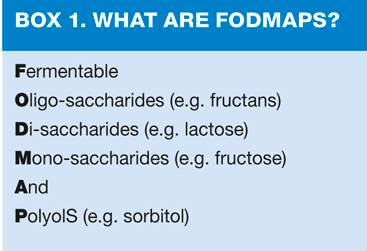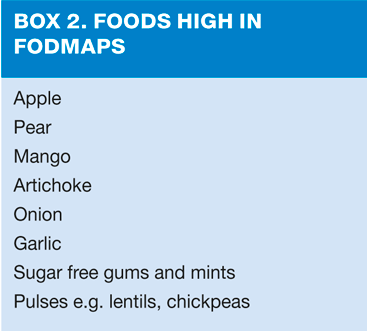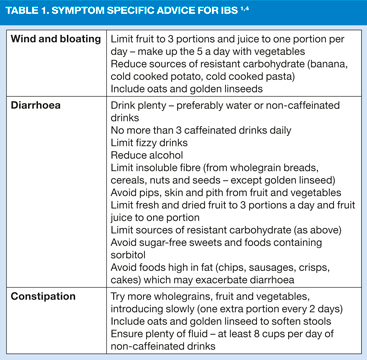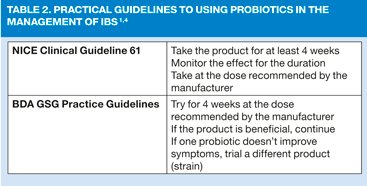Managing patients with IBS - Can diet and probiotics help?
Dr Frankie Phillips
Dr Frankie Phillips
RD
Registered dietitian and Public Health Nutrition Consultant, Torquay, Devon
Irritable bowel syndrome is an uncomfortable condition characterised by a triad of symptoms including abdominal pain, bloating and changes in bowel habits. Research suggests that diet may play a beneficial role in its management. This article looks at the evidence and suggests practical dietary advice to give to patients.
Irritable bowel syndrome (IBS) is a distressing and complex functional disorder of the gastrointestinal (GI) tract. There is no structural or biochemical basis to the disease. It is characterised by abdominal symptoms including chronic abdominal pain or discomfort, bloating, wind and alteration of bowel habits, varying between attacks of constipation and/or diarrhoea.1 This subsequently causes over-reactivity and amplifies pain.
IBS affects 10-15% of the population, is more common in women and negatively impacts on quality of life with consequent economic burdens for society, such as loss of working hours due to ill health.1
The aetiology of IBS is multifactorial: abnormal gut motility, visceral hypersensitivity, disturbed neural function of the brain-gut axis and an abnormal autonomic nervous system are all implicated in disease progression. The main underlying cause appears to be in the enteric nervous system, presenting as visceral hypersensitivity, where nerve pathways in the GI tract become more sensitive to stimulation. Other factors may also affect symptoms, including abnormal gut bacteria, lifestyle, diet and psychological factors. NICE guidelines for IBS diagnosis are specific, combining positive, symptom-based criteria with a limited number of red flags requiring urgent referral (unintentional weight loss, rectal bleeding, family history or bowel or ovarian cancer).
Due to the diversity of symptoms experienced by IBS sufferers, diagnosis and treatment is difficult and what works for one patient may not work for another. However, emerging evidence indicates that diet can help to effectively manage some patients' symptoms.
DOES DIET MAKE A DIFFERENCE?
Dietary management of functional gastrointestinal symptoms has generally focused on adjusting dietary fibre content, restricting caffeine and alcohol and avoiding high lactose loads. However, there is little or poor quality randomised controlled evidence that any of these strategies are effective.2,3
Generally, changing both diet and lifestyle can help to manage symptoms. Healthy lifestyle behaviours should include exercise, relaxation and stress management. In terms of diet, in its recent review of diet and IBS, the evidence-based practice guidelines from the Gastroenterology Specialist Group (GSG) of the British Dietetics Association identified several aspects of diet which may be important in managing IBS symptoms.4
As first line dietary treatment, patients should be advised to follow a healthy balanced diet, following a good eating lifestyle (regular meals, sitting down to eat, plenty of fluids). Practical tips include not skipping meals, not 'eating on the go' and chewing food well.
If symptoms persist, symptom-specific advice may be appropriate (see Table 1).
The type and amount of dietary fibre included in the diet can vary for individuals depending on symptoms. Fibre tends to help with constipation, but can make bloating, flatulence and diarrhoea worse. The NICE guidelines1 suggest that if dietary fibre is to be increased, the increase should be gradual to avoid exacerbation of symptoms.
Other dietary aspects to consider include:
- Low lactose diet / dairy-free diet
- Fermentable carbohydrates (the low FODMAP diet) (e.g. avoid onions, apples, pears, cabbage) - see Box 1
- Probiotics
- Elimination diets (under supervision of a dietitian)
For some people with IBS, it is necessary to check if there is any intolerance to milk and/or dairy products. However, most people with lactose malabsorption can tolerate 13g lactose without any symptoms (equivalent to 300ml milk or 500g yogurt). A lactose tolerance test can be carried out if suspected as a problem.
If no success has been achieved with the general dietary and lifestyle advice offered above, and if other diagnoses (e.g. coeliac disease) have been ruled out, a low FODMAP diet should be considered.
FODMAPs (Box 1) comprise a group of indigestible carbohydrates or sugars, including oligosaccharides, disaccharides, monosaccharides and polyols that have been shown to be osmotically active and rapidly fermentable in the gastrointestinal tract.
Various studies show these sugars are considerable triggers of gastrointestinal symptoms in patients with IBS individually or in combination.
The FODMAPS diet therefore involves a balanced diet avoiding these foods.
The main sources of FODMAPs include various fruits, vegetables, grains and dairy products (Box 2). FODMAPs are also added to packaged foods to enhance sweetness (e.g. fructose or polyols in sauces) or to improve mouth feel (e.g. inulin in low fat dairy products).
It has been demonstrated that a low FODMAP diet is highly effective in treating the symptoms of IBS, with approximately 75% of patients who are prescribed the diet reporting a sustained symptom response.5 Other studies also confirm its success.6
However, patients often report that aspects of the diet are difficult to follow, although compliance rates are high, with 77% following the diet most of the time.5 It is likely that the more strictly the diet is followed the more rapid the symptom response will be, but most people take between 2-8 weeks to improve.
The diet is individualised for each patient, providing suitable alternatives for foods they need to avoid. Menu plans and appropriate information on label reading, eating out and recipe adaptation should be provided.
The FODMAP diet is a complex regimen and should be discussed on a one-to-one basis with a FODMAP-trained dietitian.
Clearly, some cases may need a combination of dietary aspects to manage symptoms. If complex dietary advice is needed, referral to a Registered Dietitian with specialist knowledge of IBS is recommended.
A ROLE FOR PROBIOTICS?
It is thought that alterations in the gut bacteria environment are involved in IBS and consequently probiotics have been explored for their potential role in IBS management.
The increased risk of developing IBS following gastroenteritis and the co-existence of changes in faecal and gut flora environment with elevated gas production and immune activation, suggest that the therapeutic manipulation of GI microbiota with probiotic bacteria may be a beneficial therapeutic target in IBS.7
According to the 2002 joint Food and Agriculture Organization/World Health Organization (FAO/WHO) definition, a probiotic is 'a live microorganism which when administered in adequate amounts confers a health benefit on the host.'8
Probiotics are now widely marketed in the form of capsules, tablets, powders and functional foods such as fermented milks and yoghurts. The most commonly used probiotic agents are bacteria from the Lactobacillus and Bifidobacterium strains, which form part of the normal healthy intestinal microbiota. Other probiotics include the yeast Saccharomyces boulardii.
The effects of probiotics may be due to various mechanisms of action, including suppressing growth of pathogenic bacteria, blocking epithelial attachment by pathogens, enhancing mucosal function, and modulating host immune response. Furthermore, it is clear that although one probiotic agent may have a role for a specific condition, this does not mean that all probiotics are useful for that condition - there are clear agent-specific effects.
Evidence for probiotics in IBS management
Although not conclusive, a promising body of evidence now supports the idea that probiotics may play a role in alleviating IBS symptoms. The two key probiotic bacteria that are thought to be important in IBS are Lactobacilli and Bifidobacteria and there have been a number of clinical trials using both single and multiple strains of these and other bacteria.
A review of the evidence from clinical trials and systematic reviews studies published recently reported that most systematic reviews suggest that probiotics have a beneficial effect on global IBS symptoms, abdominal pain and flatulence.7 However, there are problems with meta-analyses of probiotics as different strains of probiotics may have different effects and therefore not all probiotics will result in similar benefits to IBS sufferers. The potential benefit will therefore depend on the strain or strains used and dispensing format. In addition, the placebo effect cannot be ruled out in IBS as reported symptoms are often subjective and the degree of accuracy variable.
Overall, the beneficial effects and efficacy of altering gut microbiota by probiotics to improve the symptoms of IBS have not been consistent in clinical trials and therefore it remains uncertain as an effective treatment, and as yet, probiotic food products cannot carry a health claim regarding the treatment of IBS symptoms.
Both NICE and BDA guidelines (Table 2) recommend trialling a probiotic for 4 weeks minimum, following the manufacturer's guidelines for dose. In addition, the BDA guidelines suggest that if one probiotic does not improve symptoms, patients may want to trial a different product - and therefore a different strain.
CONCLUSION
Current evidence is promising for dietary and lifestyle management of IBS. Novel strategies, including low FODMAPS diet and probiotics are attractive treatments for IBS considering the low costs and favourable safety profiles.
In the meantime, referral to a dietitian for further investigation of any dietary strategies to help manage and minimise symptoms may be appropriate. Furthermore, healthcare professionals should feel confident in trialling probiotics with their IBS patients for a minimum of 4 weeks, but patients should be informed that 'probiotics' encompasses a huge range of effective and non-effective preparations.
REFERENCES
1.NICE. Clinical Practice Guideline 61. Irritable Bowel Syndrome in Adults. 2008 http://guidance.nice.org.uk/CG61/NICEGuidance/pdf/English (Accessed August 2012).
2. Burden S. Dietary treatment of irritable bowel syndrome: current evidence and
guidelines for future practice. J Hum Nutr Diet 2001; 14(3):231-241.
3. Heizer WD, Southern S, McGovern S. The role of diet in symptoms of irritable
bowel syndrome in adults: a narrative review. J Am Diet Assoc 2009; 109(7):1204-1214.
4. British Dietetic Association. UK evidence-based practice guidelines for the dietetic management of irritable bowel syndrome (IBS) in adults. (2010) BDA, Birmingham.
5. Shepherd SJ, Gibson PR. Fructose malabsorption and symptoms of irritable
bowel syndrome: guidelines for effective dietary management. J Am Diet
Assoc 2006;106(10):1631-1639.
6. Staudacher HM, Lomer MCE, Whelan K, Irving P. Implementation of the low
FODMAP diet in the UK: How easy is it and does it work? Gut 2010;
59(supplement 1):A149.
7. Whelan K. Probiotics and prebiotics in the management of irritable bowel syndrome: a review of recent clinical trials and systematic reviews Current Opinion in Clinical Nutrition & Metabolic Care. 2011;14(6):581-587. doi: 10.1097/MCO.0b013e32834b8082 http://journals.lww.com/co-clinicalnutrition/Abstract/2011/11000/Probiotics_and_prebiotics_in_the_management_of.11.aspx (Accessed August 2012)
8. Joint FAO/WHO Working Group Report on Drafting Guidelines for the Evaluation of Probiotics in Food. London, Ontario, Canada, April 30 and May 1, (2002). http://www.who.int/foodsafety/fs_management/en/probiotic_guidelines.pdf (Accessed February 2012).
Related articles
View all Articles



